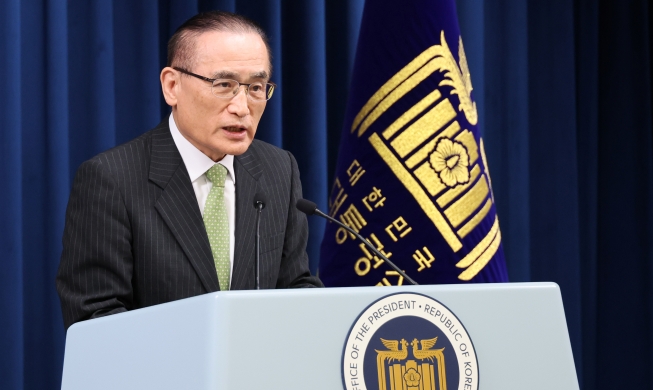- 한국어
- English
- 日本語
- 中文
- العربية
- Español
- Français
- Deutsch
- Pусский
- Tiếng Việt
- Indonesian
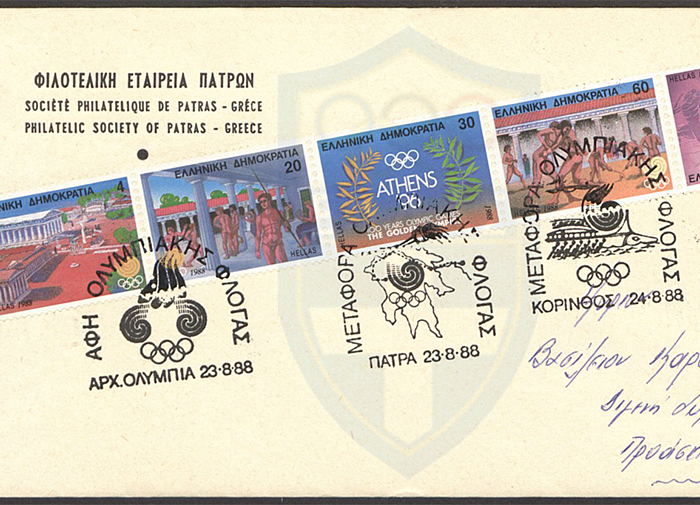
Hellenic Post issued commemorative stamps on the occasion of the Seoul 1988 Olympic Games torch relay. Seals depict the lighting at ancient Olympia on Aug. 23, 1988, the transfer of the Olympic flame at Patras, the transfer of the Olympic flame at Corinth and the final delivery in Athens. One can notice the seal with the trireme vessel that brought the flame to Athens but also the Seoul 1988 Olympic Games emblem.
The handover ceremony for the Olympic flame for the Seoul 1988 Olympic Games took place in the Panathenaic Stadium in Athens, the original home of the first modern Olympic Games in 1896. This torch ceremony was also the biggest ever up until that time. Returning to Athens in 2004, Korea once again visited the Panathenaic Stadium as the venue played host to the archery competition, where Korea ended up winning the gold.
The great archery achievements of South Korea with five Olympic medals, four gold and one bronze at the Rio Olympic Games does not come as a surprise to Olympic followers. South Korea is dubbed as being “impeccable in archery,” being the supreme nation in this sport. Its women's archery Olympic team won at every Olympiad, eight for eight, since the event was added at the Seoul 1988 Olympic Games.
August 2016 was a month of great excitement for all the fans of sports and the Olympic Games. It was a rare moment in history where almost the whole world became one, to celebrate the biggest and oldest sporting event in the world, the 31st Olympiad, that took place in the city of Rio de Janeiro in Brazil. Just for a moment, let’s remember the victories of the Korean athletes at the most spectacular ancient marble stadium back at the Athens 2004 Olympic Games, and even 16 years earlier on the same spot, the ceremony for the Olympic flame handover for the Seoul 1988 Olympic Games, which attracted the largest ever crowd of spectators until today.
The marble Panathenaic Stadium, where the archery event took place for Athens 2004 Olympic Games, wasn't a usual sport venue for the archers. Apart from shooting their arrows facing the 2,500-year-old Acropolis and Parthenon, the athletes were competing in one of the oldest operating stadiums in the world, grounds that were about 2,352-years-old. That is why its shape is different from common stadiums. It follows the ancient architecture of a parallelogram pedal shape, with the entrance at one narrow end, and it has room for the spectators on the earthen slopes of the other three sides. It was at the same site where the revived 1896 first modern Olympic Games took place, a renovated ancient stadium covered entirely by white marble. Moreover, it is here where the Seoul 1988 Olympic Games torch handover ceremony, from Greece to South Korea, took place, before being flown to South Korea for the torch relay, an unforgettable night for those in attendance, as we will see below. Understandably, the athletes were awed by the history and the energy of the site and tried competitively to leave their own winning mark on it.
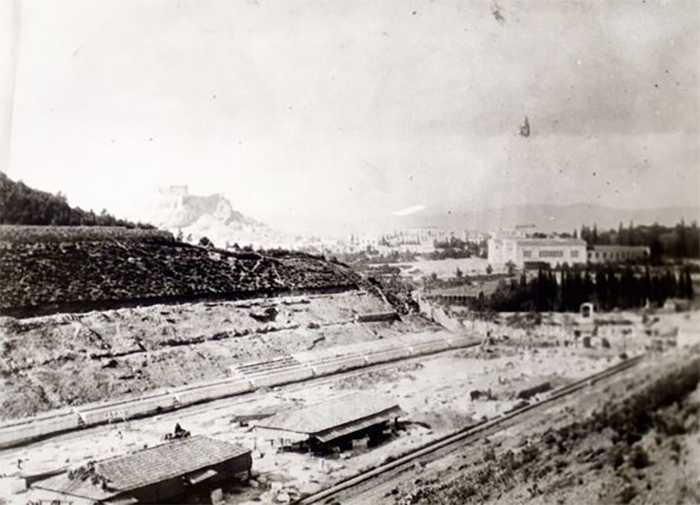
The ancient Panathenaic Stadium before its renovation for the 1896 first modern Olympic Games. At top left is the Acropolis, with the newly built Zappeion Hall to the left. It was used for the 1896 Olympic indoor events, such as fencing, and hosted again the successful Greek bid committee for the Athens 2004 Olympic Games.
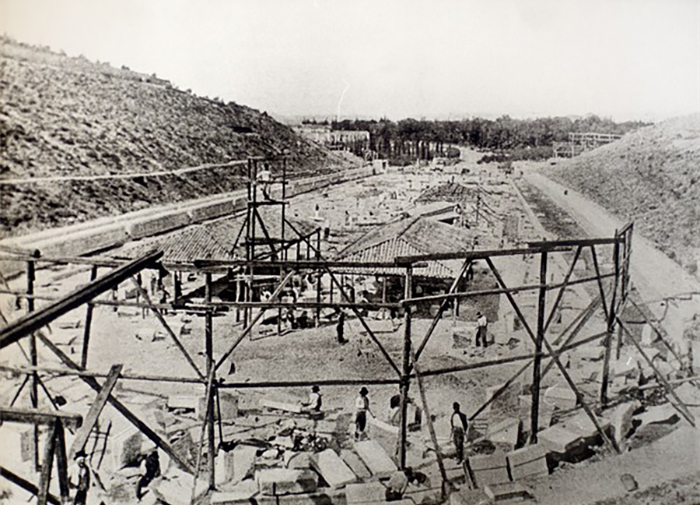
The ancient Panathenaic Stadium undergoes massive renovation work for the 1896 first modern Olympic Games. What differentiates it from modern sports venues is that it follows the ancient Greek architecture of a pedal shape.
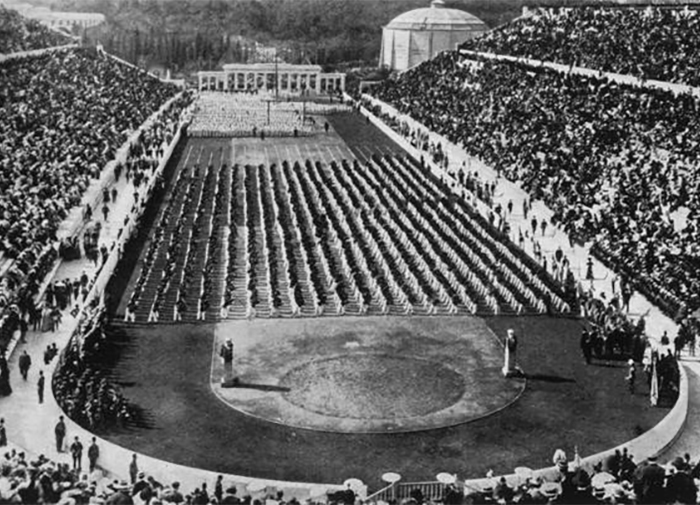
The first modern Olympic Games take place in Athens in 1896 at the then newly renovated marble stadium.
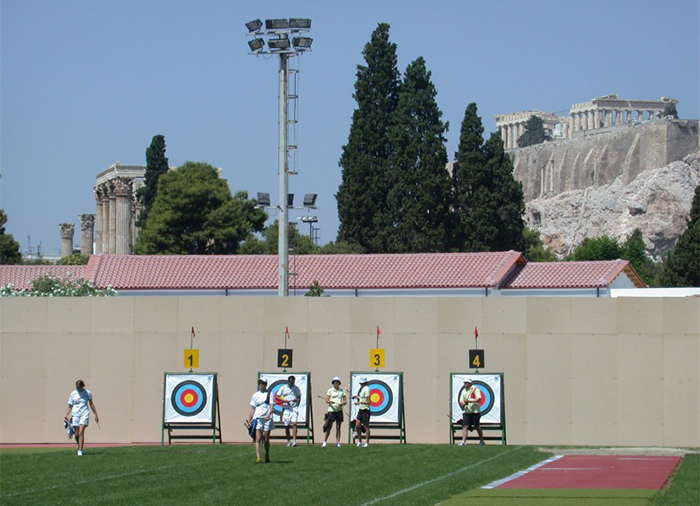
On Saturday, Aug. 14, 2004, Olympic archery athletes practice at Athens' marble stadium. The lucky athletes and spectators could see the 2,500-year-old monument of the Acropolis, as well as the Temple of Olympian Zeus (far left).
Athens' Panathenaic Stadium hosted the first modern Olympic Games in 1896 as well as the Seoul 1988 Olympic Games torch handover ceremony.
The revival of the modern Olympic Games was decided in 1894 by the then newly established International Olympic Committee(IOC), to be hosted in Athens, the birthplace of the ancient Olympic Games. As historians wrote, the enthusiasm of the Greeks for undertaking the Olympic Games was immense, and they considered it an issue of national pride. With the funds of national benefactors, the ancient stadium, a public venue built in 338 B.C. for athletic championships, was rebuilt completely from scratch in white marble to host the 1896 Olympic Games. Since then, its success has been marked by the continuation of the modern Olympic Games every four years, transcending three centuries, only to be postponed twice due to World War I and World War II.
Ninety-two years later, on Aug. 25, 1988, at the same marble stadium in Athens, the Seoul Organizing Committee officials for the Seoul 1988 Olympic Games proudly received the Olympic flame that was lit in ancient Olympia on Aug. 23 and was carried hand-in-hand around Greece for 3 days and 2 nights across 358 kilometers before entering the Panathenaic Stadium. From there, with an emotional ceremony, it began its longer journey of 4,168 kilometers, first to Jeju Island and then across the Korean Peninsula until it was lit in the Seoul Olympic Stadium cauldron on Sept. 17, 1988, during an impressive opening ceremony.
According to the official Seoul 1988 Post- Games Report, the activities surrounding the Olympic torch relay were carried out flawlessly by the organizers, with great cooperation from the Hellenic Olympic Committee (HOC). It was an immense task considering the distances travelled, the large number of people involved and the required resources. Success was also confirmed by the HOC and the Greek press at the time. Another key factor for the phenomenal handover ceremony in Athens was the full support of the then Greek minister of culture, the legendary actress Melina Mercouri, who not only urged all citizens to attend the Seoul 1988 Olympic Games torch handover ceremony at the Panathenaic Stadium, but also personally welcomed the Olympic flame with a memorial speech in front of the Parthenon on the last overnight stop before the flame traveled to Korea the next day.
The Greek people enthusiastically responded to the call and honored the Olympic invitation in an incredible gathering of more than 60,000 people who crammed the marble stadium. (The HOC claims 85,000.) It is little known that this is probably the largest ever audience for the official handover ceremony for an Olympic torch, ever since the beginning of the modern Olympic Games. In its bulletin, the HOC reported that the large crowd and its passionate participation was such that the stadium “lived moments that can only be compared to those of the Olympiad of 1896 that filled the stadium with emotion.” Greece was bidding at the time for the 1996 Olympic Games to mark 100 years since their modern beginning. The impulse of the people that night confirmed again the wish of the Greek nation to host again the Olympic Games. This wish was finally granted in 2004.
It is interesting to note that the torch for the Seoul 1988 Olympic Games reached Athens not on foot but by sea on Aug. 24 that year aboard a spectacular trireme, The Olympia, an authentic replica of an ancient Athenian 174-oared boat. The peaceful sail of the trireme toward Athens would act as a torchbearer itself, bridging the ancient Olympic Games and the modern Olympic Games in Seoul.
On Aug. 25 that year, the last day of the Greek leg of the torch relay, officials from South Korea and Greece, together with thousands of people, enjoyed a number of traditional Korean and Greek performances. The Seoul City Dance Company with 65 members and a six-member samulnori performing troupe performed at the marble stadium as they did in the days before in ancient Olympia before they lit the flame and on major stopovers for the Olympic flame in Greece. The performances showed to the world traditional culture and arts, enhancing Korea’s national prestige and the public image of the Seoul Games. The Greek hosts prepared large-scale performances by primary school students, while the Athens City Choir sung the Olympic hymn written by poet C. Palamas and composer S. Samaras, being first heard at this stadium 92 years earlier for the first modern Olympiad. Since then, it's part of the protocol of every Olympic opening ceremony. Traditional Greek dances were also performed.
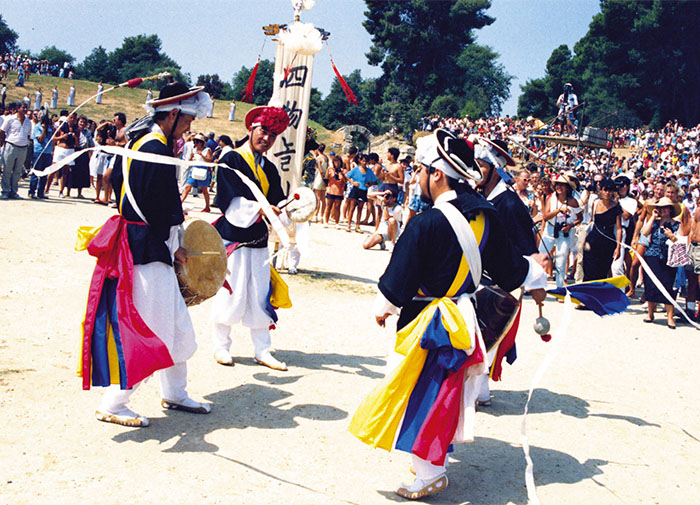
Korean samulnori artists perform at the ancient temple of Olympia before lighting the Seoul 1988 Olympic flame, with an audience of around 15,000 people.
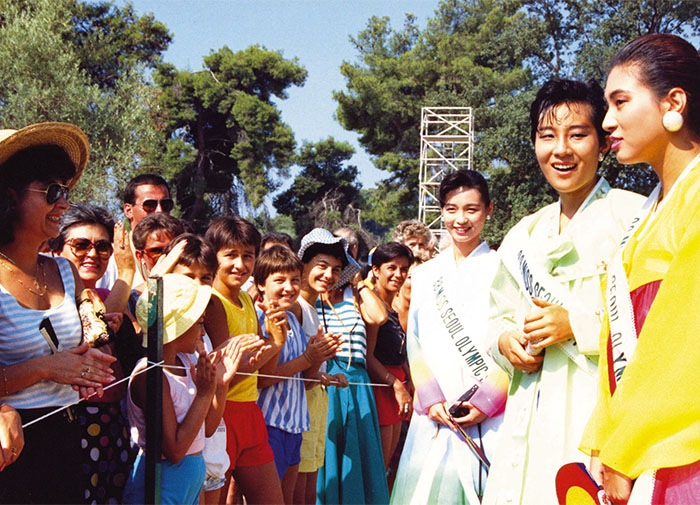
Greek people show their enthusiastic reaction at meeting for the first time real Korean people dressed in traditional Hanbok clothes. A beauty pageant accompanied the Olympic torch.
The festive mood and the enthusiasm were further heightened at 9:38 p.m. that evening when the last torch bearer entered the stadium to deliver the Olympic flame. He slowly moved through the 161 flags of the countries that would participate in the Seoul 24th Olympiad, a record number of countries until then, and ignited it on the Olympic altar. Candles were lit from the Olympic flame and thousands of small lights held by the audience created an emotional atmosphere worthy to the Olympic values. The event was broadcasted live on Greek television.
The most touching moment, echoed by the cheering of the audience, was when the president of the HOC passed the flame to the mayor of Seoul, Kim Yong-nae.
The president of the HOC read a message from the then IOC president, Juan Antonio Samaranch, which ended with the worlds, “The flame, bearer of history and friendship, is leaving the ancient and modern land that gave birth to it. Allow me to wish it to bring to Seoul, this new world that it will touch, the Olympic message of fraternity, progress, hope and peace.”
The speech by Seoul's mayor had certainly touched the hearts of Greeks everywhere when he enthusiastically declared, “The Seoul Olympics promise to become a great global festival, as 161 countries, the largest ever in Olympic history, have committed to the Seoul Games by transcending racial, religious and ideological differences. The spirit of the ancient Greek Olympiad and the ideals of peace for mankind, inspired by Baron Pierre de Coubertin, will thus be revived in Korea, a country of the East. We will pray for the continuous prosperity of Greece and its people who have greatly contributed to world peace by creating the Olympic Games.” When he finished his speech in Greek, the audience cheered and applauded ecstatically.
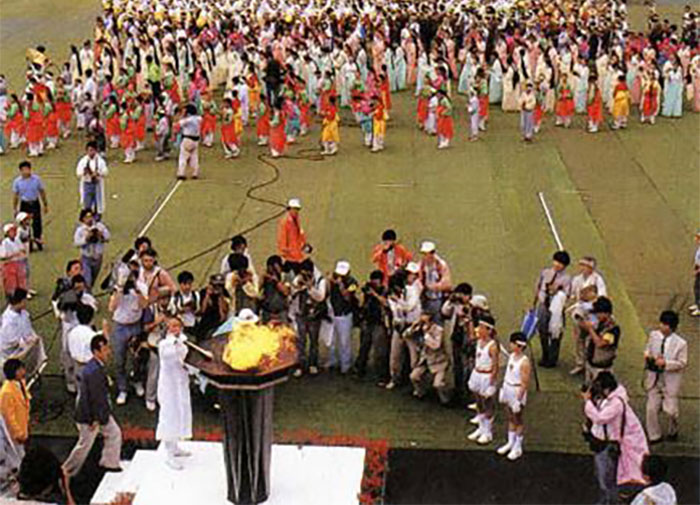
The Olympic flame arrives in Korea. The Korean leg of the relay started at 11:45 a.m. on Aug. 27, 1988, at the Jeju International Airport.

A map shows the route of the Olympic torch relay in Korea for the Seoul 1988 Olympic Games.
The flame was then placed in a safety lamp and left the stadium with the Korean delegation of 187 people from the organizing committee, the city of Seoul, citizen representatives, journalists, broadcast and art groups, all onboard a special flight. Before landing on Jeju Island, the Olympic flame made a stopover in Bangkok that was welcomed with many festivities.
The power of the Olympic flame that was lovingly carried hand-in-hand from the ancient temple of Hera to Seoul, met its purpose well. The Seoul 1988 Olympic Games have stayed in history as one of the most successful and peaceful Olympiads, gathering the largest number of nations up until that time. It contributed to the country’s political and economic development and created a future bridge for Korea with the whole world.
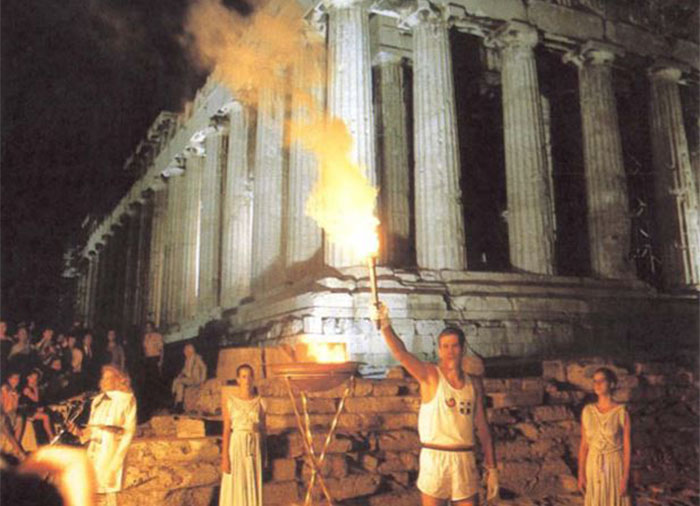
Greek Minister of Culture Melina Mercouri (left) welcomes the Seoul 1988 Olympic flame at the Acropolis.
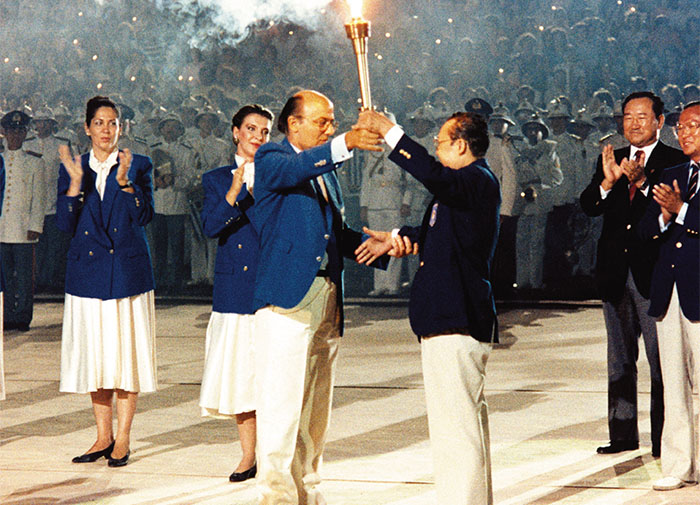
On the night of Aug. 25, 1988, the president of the HOC hands over the Olympic flame to the mayor of Seoul at the Panathenaic Stadium in Athens. This moment gathered the biggest applause and cheers from the audience.
http://imnews.imbc.com/20dbnews/history/1988/1813057_19338.html
Korean media broadcasts the lighting of the Olympic flame in Greece and the beginning of the torch relay for the Seoul 1988 Olympic Games, on Aug. 23, 1988.
Korea returns to the Panathenaic Stadium for the Athens 2004 Olympic Games and soars with medals in the archery events.
After 108 years, in 2004 the Olympic Games returned to their birthplace in Greece. It was apparent that the Panathenaic Stadium from the 1896 Olympics would open again to host some of the events. From Aug. 15 to 21, 2004, it hosted the archery competition and was the final venue for the women’s and men’s marathons on Aug. 22 and 29. The marathon would begin in the city of Marathon, just as it did in 1896, a competition inspired by the ancient historical run of one soldier to Athens from Marathon in order to announce the joyful news of the Greek victory at the epic battle of Marathon in 490 B.C.
The Olympic athletes in the archery competition and in the marathon tried their best to win a place on the medals podium, to be eternally identified with the marble stadium. The admiring words and emotions of the athletes for the historic venue during their interviews reflect this goal.
Not to be forgotten is that during the Athens 2004 Olympic Games, in a very important gesture worthy of Olympic values, North Korea and South Korea marched together in the opening ceremony under one "unification" flag, as one delegation. The thousands of audience members who witnessed the moment applauded and cheered them warmly, and the international officials stood up and welcomed them with a warm round of applause.
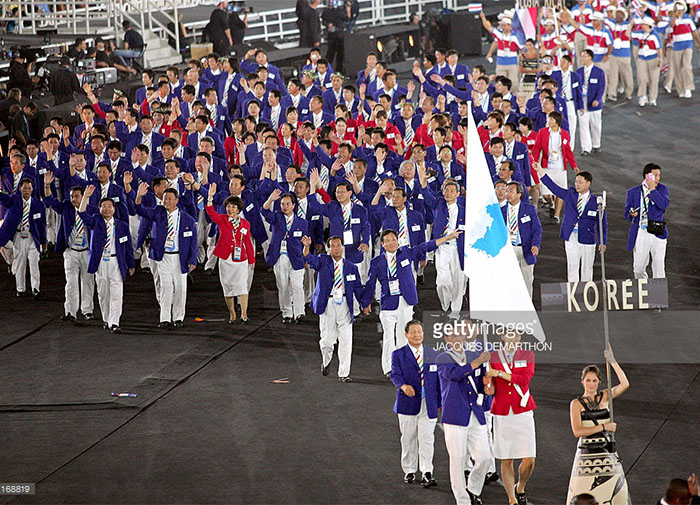
The North Korean and South Korean Olympic squads enter the stadium under one flag at the Athens 2004 Olympic Games opening ceremony. The clothes of the placard bearers represents antique Greek pottery.
https://www.youtube.com/watch?v=8dTVHvmhrSk
A video shows the entrance of the North Korean and South Korean Olympic squads marching under one flag at the Athens 2004 Olympic Games opening ceremony.
The Korean archery athletes excelled at the Panathenaic Stadium by ranking first in medals, obtaining four medals -- three gold and one silver -- followed by Taiwan, or "Chinese Taipei," and then Italy. After four of the four events, Korea won gold and silver medals in the women’s individual, with Park Sung-hyun and Lee Sung-jin standing atop the podium. In the women’s team event, Korea won the gold medal with Lee Sung-jin, Park Sung-hyun and Yun Mi-jin. In the men’s team event, Korea cheered another gold medal with Im Dong-hyun, Jang Yong-ho and Park Kyung-mo.
In the marathon, although Korea did not obtained any medals, it still saw its athletes finish among the top 20 runners. In the men’s marathon, Lee Bong Ju finished 14th and Ji Yong Joon finished 17th, among 81 athletes. In the women’s marathon, Lee Eun Jung finished 19th, among 66 athletes.
The Panathenaic Stadium in Athens will reconnect with South Korea in two years when the officials from the PyeongChang 2018 Winter Olympic Games organizing committee will receive the Olympic flame in a handover ceremony there, lit first in ancient Olympia. We hope the ceremony will be as grandiose and as crowded and peaceful as the Seoul 1988 Olympic Games and be engraved in everyone’s heart.
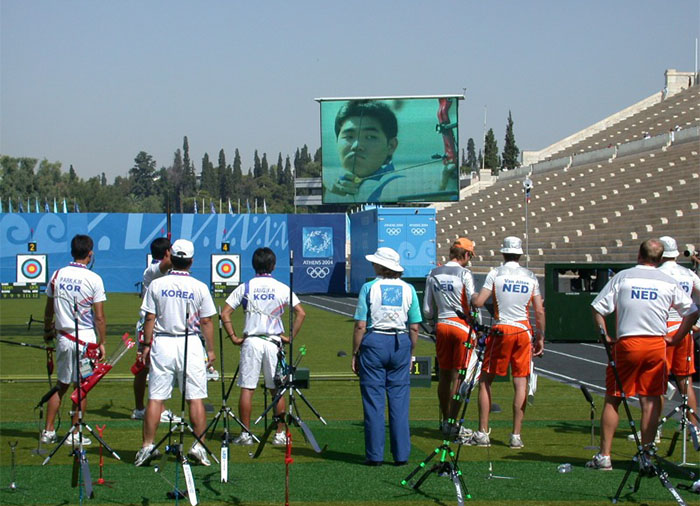
The men's team eliminations took place on Aug. 21, 2004. The Korean archery gold medalists compete with the Netherlands at the Panathenaic Stadium in Athens.
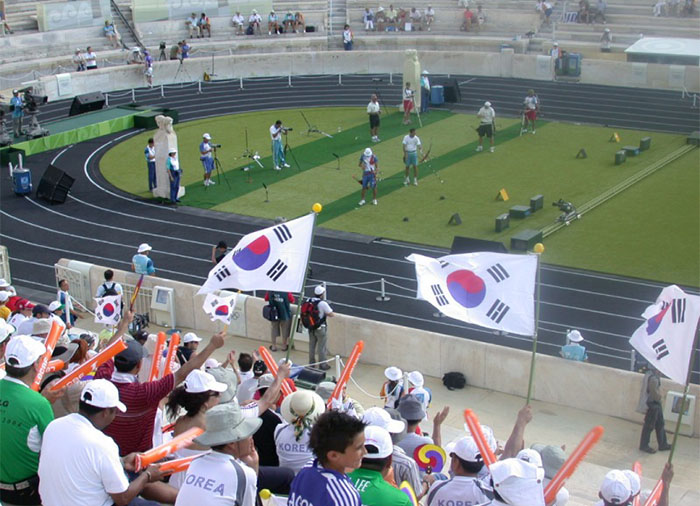
On Aug. 17, 2004, at the Panathenaic Stadium in Athens, the Korean community in Greece fervently supports their compatriot athletes.
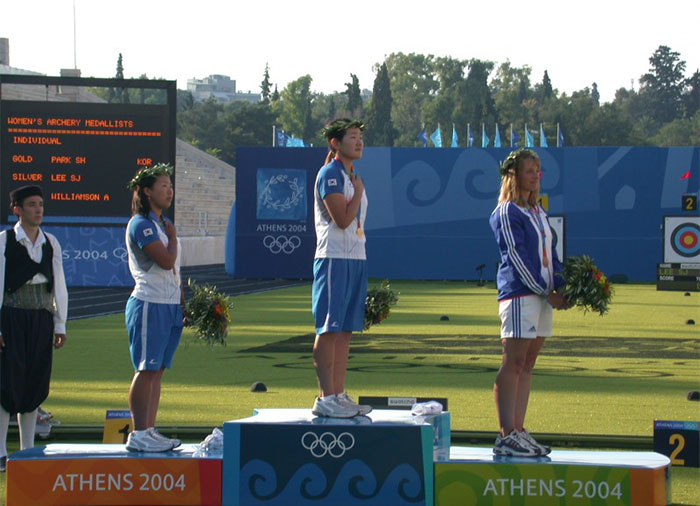
The glorious moment of the medals ceremony takes place for the archery event. Korean women's Olympians take the gold and silver, and the South Korean national anthem plays as the South Korean flag is raised at the Panathenaic Stadium in Athens.
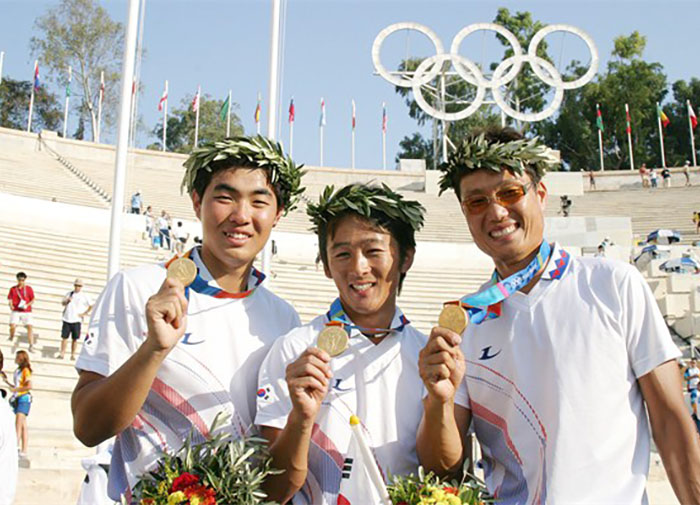
Korea’s archery Olympians celebrate their gold medals at the Athens 2004 Olympic Games at the Panathenaic Stadium in Athens.
By Katerina Lygkoni
Korea.net Honorary Reporter
Photos:
http://hoc.gr
http://www.zappeion.gr
http://www.panathenaicstadium.gr
http://www.history.com
http://www.gettyimages.com
http://library.la84.org
http://www.imbc.com
https://www.youtube.com
http://www.archery-gp.de
https://www.olympic.org
